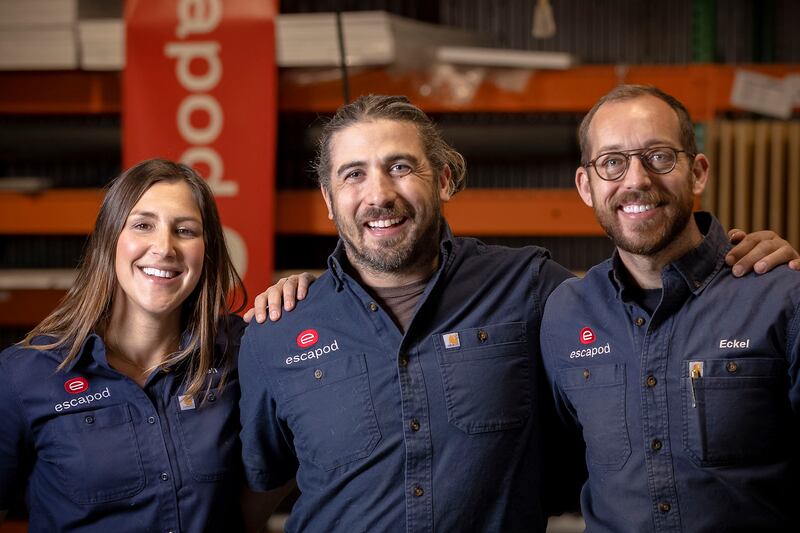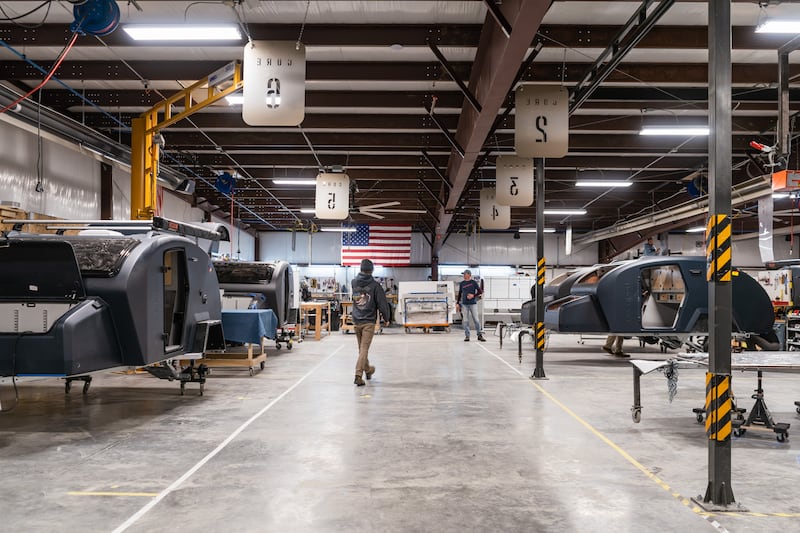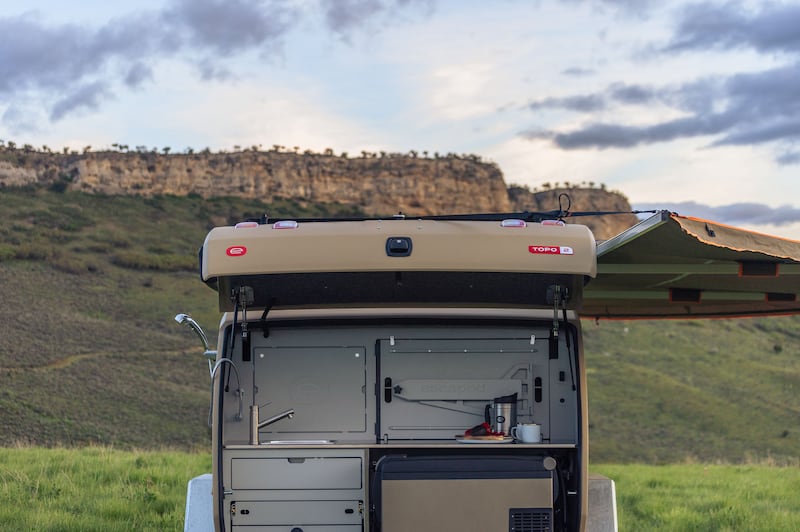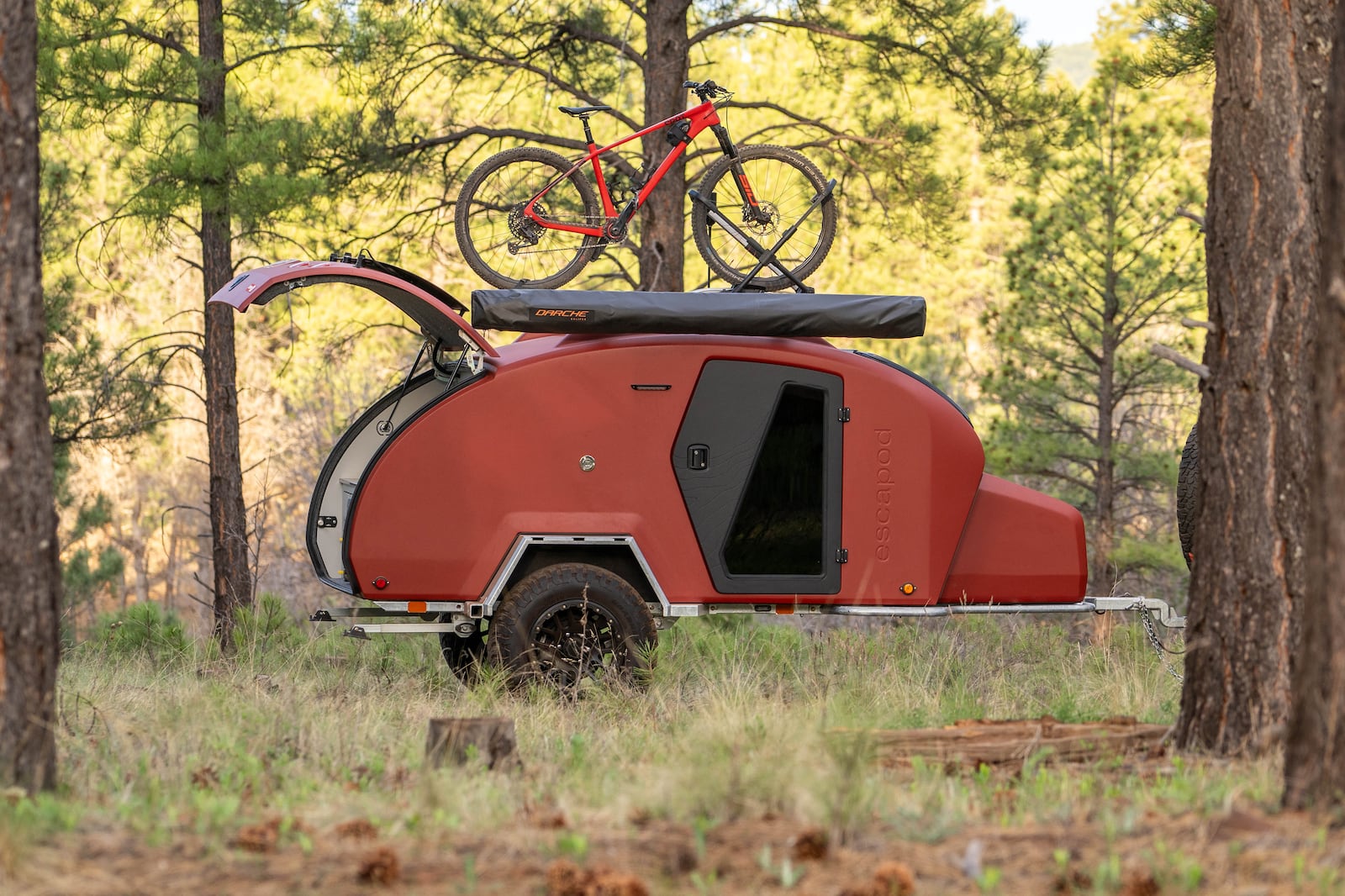Tucked away in the Wasatch Mountains, Coalville, Utah, (population: 1,533) may appear to its occasional outsider as a sleepy town — and they’re right. Most who amble into businesses for lunch here know proprietors by their first names. Some even get invited to swap free cinnamon rolls for honest opinions. Herds of wooly sheep and well-fed cows gather in nearby fields. By all accounts, life feels slower here.
The town earned its name when coal was discovered nearby many years ago. Today, it’s where husband-and-wife entrepreneur duo Chris and Jen Hudak manufacture teardrop campers.
Building their first teardrop trailer preceded the company, and it solved a personal problem. When the Hudaks initially met, both were mountain biking in Moab. Soon after, they traveled together to compete in races and stayed at campsites. Races were the highlight; camping was a constant headache. They moved what amounted to a small village every time they traveled, filling up all available pockets of space in their 2012 Mercedes-Benz GLK with a couple bikes, a couple dogs, a tent and cooking equipment.
“Looking at what was out there, I just wasn’t happy with what was on the market that we could actually afford,” Chris says. “And so I said, ‘Well, maybe I’ll just build something.’”
When that something turned out to be a teardrop trailer, it came as a shock to Jen.
“I knew Chris as a guy who managed restaurants and raced mountain bikes, not someone who built campers,” Jen says.

Though Chris hadn’t built a teardrop trailer before, he grew up a builder, using his hands and ingenuity to restore his first car at 16 — a 1968 Austin-Healey Sprite. Multiple motorcycles followed, then a 1948 Cadillac and even a beautiful 1954 Cadillac Eldorado. He liked the process of instilling life where there was little to none, of bringing whole vehicles back from the dead.
“That’s where I learned to use the part of my brain that traditional education doesn’t teach,” Chris says. “How does an engine work? The only [way to find the] right answer is to take it apart.”
Chris spent six months building the trailer using a one-car garage in Salt Lake City as his makeshift workshop, eventually relocating to a friend’s larger garage to cross the finish line, wrapping up in 2015. Sedona, Arizona, was its maiden voyage.
Trailers are fast, but word of mouth is faster
As Chris and Jen continued to travel, camp and race, their light and convenient trailer never went unnoticed among the mountain biking community. The easy-to-transport trailer acted as a ready-made base camp, eliminating the need to set up a tent and battle the elements.
An idea grew. Over the next year and a half, Chris simmered on a larger possibility: creating a company that built and sold trailers. In the summer of 2016, just a month before he married his bride, Chris told Jen he wanted to turn his newly acquired hobby into a business.
“I could see the sparkle in his eyes,” Jen says. Together, they immediately brainstormed a name for the venture, landing on Escapod (pronounced “ESS-kuh-pod”), combining the “pod” that a person sleeps in with “escapade.”
“Chris and I lived — and still do live — for adventure,” Jen says, and they wanted to share that opportunity with other like-minded individuals. One of their first calls was to a longtime friend and current Head of Product Design Chris Eckel. The couple shared drawings on a napkin, and Eckel drafted a logo that landed on the side of their trailers.
Six miles down the road from Coalville, in Wanship, they built a new trailer — what would be the company’s first — and once again in less-than-optimal conditions. Every time it rained, so many leaks in the garage roof revealed themselves that Chris had to move parts around to save his project from getting soaked. His efforts were hardly in vain: Three months later (just half the time it took during his first go-round), the first Escapod trailer was completed.

“At that point, it was a pretty rudimentary trailer,” Eckel says, “Kind of a ‘Harbor Freight built’ frame, with simple plywood and aluminum construction.”
After borrowing Chris’s trailer and heading to the Pacific Northwest for seven weeks, Eckel shared a list of suggested improvements. Both he and Joshie Fishbein joined as partners in 2018, the same year Escapod hired its first employee.
“I was up for a change,” Eckel says. “I said, ‘If you want to go into business together, let’s do it. I’m willing to get my hands dirty. I’ll help you build this thing from the ground up.’”
In 2019, the company grew largely by word of mouth — but the Escapod team could only build three trailers a month, and a bigger facility was very much needed. Their trailers belonged in the mountains, so they decided they’d go there too. Chris and Jen bought and renovated the building they are now housed in, which was formerly Crandall Ford until the 1940s. When Escapod took it over, it’d been unoccupied for a quarter of a century.
“People are often surprised with what we’re doing here in Coalville, a small town with a small workforce,” Chris says. “But we’ve been able to revitalize the town, taking a dilapidated building, setting up our company and becoming part of this community. It’s why we chose to be here. … When you have 16-year-old boys and girls who have raised lambs and they invite you to bid on them at the 4-H auction, that’s special.”
Then vs. now
In March 2020, Chris and Jen’s first baby was born. Two weeks later, the COVID-19 pandemic essentially shut the world down. This made for imperfect timing, as they’d secured their new space and committed to paying their biggest monthly rent yet.
The last thing they expected was a significant spike in trailer sales.
“We want to bring people together to fully experience what these trailers are designed for ... That’s making connections and memories outdoors.”
— Chris Hudak
“It was a crazy time. We figured that, in this space, success would be an increased ability to produce six trailers a month,” Chris says, as they were hoping to double their production with the move. The following month, they took pre-orders on an unexpected 63 trailers. The company responded in two ways: by quickly scaling how many trailers they could build and investing in a more refined model that would immediately follow their first.
Since then, it’s been a largely steady journey of gradual growth. In the beginning, Eckel recalls coming home to his wife covered in metal grease and smelling even worse than he looked. He also recalls a mutual decision among the Escapod partners not to pay themselves for six months in a row, finding the wherewithal to work 80 hours a week to build trailers and only taking breaks when home-cooked meals from other halves arrived.
“I look back to those first couple of years, and it was delightfully scrappy, almost laughable,” Eckel says. “We have problems now, and we had problems then … but it’s no longer about covering trailers with tarps before leaving for the weekend because the roof might leak and ruin work in progress. We did whatever it took to make it work. God bless our customers, who have been understanding and supportive as we’ve learned those lessons and still are.”
Part of that learning process includes reminding themselves that their product encourages their customers to get outdoors regularly, usually with loved ones in tow.
“We take great pride in bringing families closer together — getting them outside and away from their screens and going places where they can be together, creating memories that will last a long time,” Jen says.
“And that’s where we excel. We are not pitching the idea to go camping, stay in your fifth wheel, and watch a movie,” Chris says. “It’s, ‘Hey, get to remote locations. Enjoy some solitude. Enjoy being and cooking outside. Enjoy one another’s company near a campfire and then a warm, dry place to sleep.’”

The majority of Escapod’s customers are weekend warriors, be they mountaineers, ice climbers or mountain bikers. Some older customers aren’t exactly mountaineers anymore but want to return to the outdoors. Some aren’t comfortable camping in a tent anymore, but they can enjoy the Escapod’s built-in queen-sized mattress. And some are like Andrew Muse, who traveled to Baja California for six weeks with his trailer, surfing up and down the coast.
“They’re the same kinds of people, really, just a couple of generations apart sometimes,” Chris says.
Making outdoors memories
As an entrepreneur who’s learned along the way, Chris says it’s the constant evolution of what a company journey is allowed to look like that has been his biggest lesson thus far.
“I used to think, ‘Once we get this figured out, we’ll cruise right along,’ but we get thrown curveballs and unforeseen problems constantly. Part of being an entrepreneur is the enjoyment of attacking those curveballs,” he continues. “This is not a clocking in and clocking out kind of business. We go to work quite sure somebody may ask us to do something today that they didn’t ask us to do yesterday. We have an increased ability to attack problems head-on. … Because I’m systems-focused, I enjoy finding out what the system is: what half production looks like, what 4x production looks like, what a new product will look like, what pulling back on a product looks like. Being flexible and willing to explore and learn — those are the enjoyable parts.”
In the future, Chris envisions a way to build a community that extends beyond selling more trailers. For years, he’s dreamt of hosting an event for Escapod customers that includes speakers, towing clinics and even timed flat tire changes.
“We want to bring people together to fully experience what these trailers are designed for,” Chris says. “That’s making connections and memories outdoors.”

